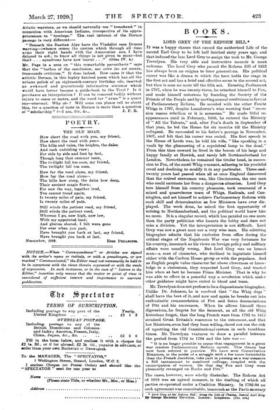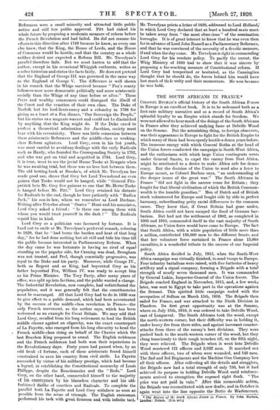BOOKS.
LORD GREY OF THE REFORM' BILL.* It was a happy chance that caused the authorized Life of the second Earl Grey to be left half finished sixty years ago, and that induced the late Lord Grey to assign the task to Mr. George Trevelyan. His very able and instructive memoir is most welcome. The Lord Grey who passed the Reform Bill of 1832 has always been an enigma to later generations. His political career was like a drama in which the hero holds the stage in the first act and has a brief and effective scene in the second act, but then is seen no more till the fifth act. Entering Parliament
in 1787, when he was twenty-three, he attached himself to Fox, and- made himself notorious by founding the Society of the Friends of the People and by moving annual resolutions in favour of Parliamentary Reform. He seceded with the other Foram Whigs in 1797, despite Lansdowne's wise warning that " seem- sion means rebellion or it is nonsense." He made fitful re- appearances until in February, 1806, he entered the Ministry
of "All the Talents," and, after Fox's death in September of that year, he led the House for six months till the Ministry collapsed. He succeeded to his father's peerage in November, 1807, and felt that, his career was ended. His first speech in the House of Lords was, he told his wife, "like speaking in a vault by the glimmering of a sepulchral lamp to the dead."
From this time onward he lived in the bosom of his large and happy family at Howick, and rarely left Northumberland for London. Nevertheless-he remained the titular head, in succes- sion to Fox, of the small Whig remnant, adhering to his youthful creed and declining to modify it in any particular. Three-and- twenty years had passed when all at once England discovered
that the retired statesman was,. like Gincinnatua, the one man who could extricate her from a dangerous situation. Lord Grey tore himself from his country pleasures, took command of a mixed* and. quarrelsome team of Whigs, Radicals, and Can- gites, and set himself to achieve Parliamentary Reform with such skill and determination as few Ministers have ever dis-
played. The work done, he seized- the first opportunity of retiring to Northumberland, and the political world knew him no more. It is a singular record, which has pnerled no one more
than the party politician who haunts the lobby and dare not miss a division. Yet the interpretation is not difficult. Lord Grey was not a great man nor a very, wise man. His admiring
biographer admits that his exclusion from. office during the critical stages of the Napoleonic War was, very fortunate for his country, inasmuch as his views on foreign policy and military affairs were usually wrong. But Lord Grey was an honest man—a, man of character, who declined to ingratiate himself either with the Carlton House group or with_ the populace. And as. English people value character far above cleverness or know- ledge in a statesman, they respeoted Lord Grey, and trusted him when at lard he became Prime Minister. That is why he was able to effect in a peaceful way. a revohition - which under other guidance might have ended in blood and team.
Mr. Trevelyan does not profess to be a dispassionate biographer. Unlike Dr. Johnson, he is resolved that "the Whig dogs" shall have the best of it, and now and again he breaks out into enthusiastic commendation of Fox. and fierce denunciations of Pitt and his successors. When he allows himself these
digressions, he forgets for the Moment, as all, the old Whig historians forgot, that the long French wars-from 1793 to 1815 strained Great. Britain's resources to the uttermost, and that
her Ministers, even had they been willing, dared not run the risk of upsetting the old Coruditutional system in such troublons times-. Mr. Trevelyan ventures to draw, a parallel between the period from 1792 to 1794 and the late war :—
"It is no longer possible to argue that engagement in -a great war renders Parliamentary Reform unsafe. This theory haa now been refuted in practice. We have seen Conservative Ministers, in the midst of a struggle with a foe more formidable than the French Jacobins, tak• part in passing as a war measure a Bill tantamount to manhood suffrage. coupled with the emancipation of women. On that day Fox and Grey were pleasantly revenged on Burke and Pitt.'
The cases, however, were wholly dissimilar. The Reform Act
of 1918 was an agreed measure, in the drafting of which all parties co-operated under a Coalition Ministry. In 1792-94 no such agreement was conceivable, inasmuehas the Parliamentary
• Lord Grey of tke Reform beiniAlte Mips, Marina Broad Bari Greg By George Macaulay Trevelyan. London: Longman', gla. nat4
Reformers were a small minority and attracted little public notice and still less public approval. Pitt had risked his whole future by proposing a modeasto meaaure of reform before the French Revolution and had failed. He did not resume his efforts in this direction after 1789 because he knew, as every one else knew, that the King, the House of Lords, and the House of Commons would be hostile, and that the country as a whole neither desired nor expected a Reform Bill. Mr. Trevelyan's parallel therefore fails. But we must hasten to add that the author, except in his occasional Whiggish outbursts, writes as a sober historian and states the facts fairly. He does not pretend that the England of George III. was governed in the same way as the England of George V. The difference is well shown in his remark that the Whigs survived because "Fox's scanty followers were more democratic politically and more aristocratic socially than the Whigs of any time before or after." These Peers and wealthy commoners could disregard the illwill of the Court and the vexation of their own class. The Duke of Norfolk lost his lord-lieutenancy and a colonelcy in 1798 for giving as a toast at a Fox dinner, "Our Sovereign the People," but his status as a magnate was not and could not be diminished by anything that the King might do. If the Duke cared to profess a theoretical admiration for Jacobins, society must bear with his eccentricity. There was little connexion between these aristocratic Reformers and the middle-class or working- class Reform agitators. Lord Grey, even in his hot youth, was most careful to avoid any dealings with the early Radicals such as Hardy, who founded the Corresponding Society in 1792, and who was put on trial and acquitted in 1794. Lord Grey, it is true, went to see the jovial Home Tooke at Newgate when he was awaiting trial, but there was no love lost between them. The old betting-book at Brooks's, of which Mr. Trevelyan has made good use, shows that Grey bet Lord Townshend an even guinea that Tooke would not be hanged, while "General Fitz- patrick bets Mr. Grey five guineas to one that Mr. Home Tooke is hanged before Mr. Pitt." Lord Grey retained his distaste for Radicals to the end, though be bore patiently with "Radice Jack," his son-in-law, whom we remember as Lord Durham.. Writing after Pcterloo about " Orator " Hunt and his associates, Lord Grey asked a friend : "Is there one among them with whom you would trust yourself in the dark ? " The Radicals repaid him in kind.
Lord Grey as a politician was favoured by fortune. It is hard not to smile at Mr. Trevelyan's perfervid remark, referring to 1829, that he "had borne the burden and heat of that long day," for he had done nothing but sit still and bide his time till the public became interested in Parliamentary Reform. When the day came he was fortunate in having no rival of equal standing on the popular side, for Canning was dead, Brougham was not trusted, and Peel, though essentially progressive, was loyal to the Duke and his party. Moreover, while George IV., both as Regent and as King, had boycotted Grey as his father boycotted Fox, William IV. was ready to accept him as his Prime Minister. The Tory Party, after many years of office, was split up into factions, and the public wanted a change. The Industrial Revolution, now complete, had redistributed the population, and it was generally felt that the constituencies must be rearranged. All that Lord Grey had to do in 1830 was to give effect to a public demand, which had been accentuated by the success of the middle-class revolution in France—the only French movement, as the author says, which has been 'welcomed as an example for Great Britain. We may add that Lord Grey, recalled from his long retirement to lead the British middle classes against an oligarchy, was the exact counterpart of La Fayette, who emerged from his long obscurity to head the French middle-class rising on behalf of the Charter which the last Bourbon King proposed to annul. The English nobleman and the French nobleman had both won their reputations in the Revolutionary days. Forty years had passed when, by an odd freak cf fortune, each of these aristocrats found himself constrained to save his country from civil strife. La Fayette oucceeded by virtue of his military prestige, which had become a legend, in establishing the Constitutional monarchy of Louis Philippe, despite the Reactionaries and the "Reds." Lord Grey, on the other hand, commended himself to the majorityof his countrymen by his blameless character and his old- fashioned dislike of courtiers and Radicals. To complete the parallel both La Fayette and Lord Grey withdrew as soon as possible from the scene of triumph. The English statesman performed his task with great firmiaess and with infinite tact. Mr. Trevelyan prints a. letter of 1820, addressed to Lord Holland; in which Lord Grey declared that at least a hundred seats must be taken away from " the most obno eious " of the nomination. boroughs. It is of great interest to know that he was even then far in advance of Lord John Russell as a Parliamentary Reformer, and that he was convinced of the necessity of a drastic measure, if and when the day came. Mr. Trevelyan is right in commending' Lord Grey for his resolute policy. To pacify the unrest, the Whig Ministry of 1830 had to show that it was sincere by proposing a far-reaching measure of Constitutional reform. If Lord Grey had temporized or hesitated, as the Canningites thought that he should do, the forces behind him would have lost much of their unity and their momentum. He won because he was bold.



































 Previous page
Previous page